How to Know When a Kindergartner Needs to See a Therapist
A kid might not be able to explain the emotions they’re feeling, but their behavior offers parents insight as to when it’s time to seek professional help.

Younger children are not known for being insightful about their own mental health or therapy needs. And parents are often overly confident about their ability to diagnose and solve their kid’s apparent emotional woes. The result? Kids in distress remain in distress as parents become frustrated. The best way to break the cycle? Be on the lookout for signs of trouble and be quick to seek professional help.
“Children are so multifaceted,” explains clinical psychologist Dr. Giamarie Daino. “There are so many things going on with them that sometimes it’s not just one clear indication.” Instead, she explains, there’s more likely a constellation of warning signs.
In younger children, behavior changes are linked to development. Psychological struggles can often stop a kid’s progress in its tracks or even seemingly turn back the clock, explains Daino. “A common one for children is if they start to regress developmentally,” she says. “Or they might fail to reach new milestones.”
That means that children who were once speaking in full sentences may revert back to baby talk or just use a few words. On the other hand, kids who should have progressed to more complex language skills may still be stuck with just a few words. Kids who need help from a therapist may also become more dependent, needy, and clingy. Others who were potty trained may start bedwetting.
Aside from changes in developmental progress, which can be subtle and hard to notice, young children in need of therapy might also show more overt behavioral issues. “Another sign is acting out,” Daino says. “Children might have tantrums that they don’t normally have or longer, more frequent tantrums.”
How to Tell if a Child Needs Therapy
- Look for developmental delays or regressions, like losing language, bedwetting or neediness.
- Pay attention to emotional changes that could include an increased in tantrums.
- Keep an eye out for physiological changes like increased sleeping or loss of appetite.
- Give greater thought to these changes when they correlate with national tragedies or changes in a child’s life like a divorce or loss of a friend or relative.
Children struggling with their mental health may also exhibit changes related to their physiology. These changes might include an inability to stay awake or a desire to spend more time sleeping. And some kids might exhibit a change in their appetite, turning away from food when they were once good eaters.
Finally, for the youngest school goers. Parents might see a change in academic engagement. This might be harder for parents of Kindergartners to suss out considering their kids are new to academics. But if a child who was once excited to go to school suddenly becomes less so, or projects in class are coming home uncompleted or poorly completed, there may be an underlying issue.
Daino notes that extra thought should be taken by parents when changes they notice in their child are correlated with changes in a child’s life. “Even if it doesn’t directly affect them,” she explains, noting that changes in the world around a kid can be just as significant as a change closer to home. “Especially news of tragedies. Anything that’s a different experience — a parents’ divorce, the loss of a friend or family member — any significant change in a child’s life.”
Still, some parents may be reluctant to seek outside help for their child. But Daino urges parents to have faith in their own understanding of their children. “Trust your intuition. As a parent, you’re an expert on your children. You know best when something doesn’t seem right.”
Diano also notes that if parents want more assurance, most child therapists will offer a free short consultation that can help a parent determine if their help is or isn’t needed. And if it is needed, parents should be open with their child when offering therapy.
“Simplify it. Just tell a child you really care about you and you’re concerned,” Diano says. “Frame it in a positive light, make it feel comfortable and not forced.”
This article was originally published on